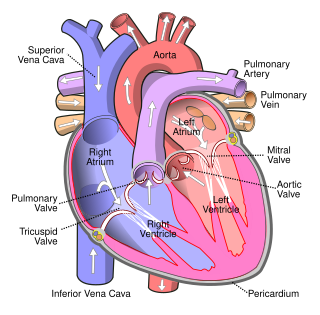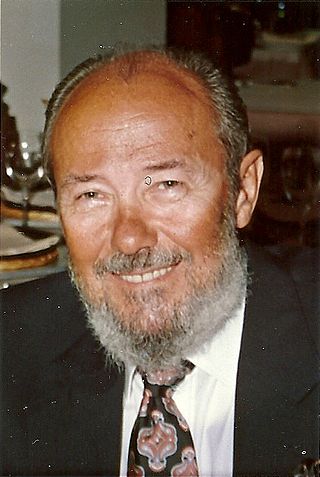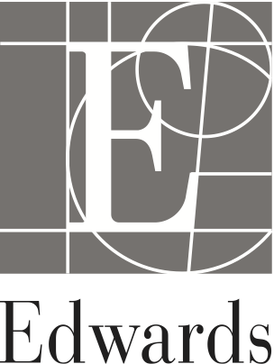
The aortic valve is a valve in the heart of humans and most other animals, located between the left ventricle and the aorta. It is one of the four valves of the heart and one of the two semilunar valves, the other being the pulmonary valve. The aortic valve normally has three cusps or leaflets, although in 1–2% of the population it is found to congenitally have two leaflets. The aortic valve is the last structure in the heart the blood travels through before stopping the flow through the systemic circulation.

An artificial heart is an artificial organ device that replaces the heart. Artificial hearts are typically used to bridge the time to complete heart transplantation surgery, but research is ongoing to develop a device that could permanently replace the heart in the case that a heart transplant is unavailable or not viable. As of December 2023, there are two commercially available full artificial heart devices; in both cases, they are for temporary use, of less than a year, for total heart failure patients awaiting a human heart to be transplanted into their bodies.

A ventricular septal defect (VSD) is a defect in the ventricular septum, the wall dividing the left and right ventricles of the heart. The extent of the opening may vary from pin size to complete absence of the ventricular septum, creating one common ventricle. The ventricular septum consists of an inferior muscular and superior membranous portion and is extensively innervated with conducting cardiomyocytes.
Aortic valve replacement is a procedure whereby the failing aortic valve of a patient's heart is replaced with an artificial heart valve. The aortic valve may need to be replaced because:

Cardiogenic shock is a medical emergency resulting from inadequate blood flow to the body's organs due to the dysfunction of the heart. Signs of inadequate blood flow include low urine production, cool arms and legs, and decreased level of consciousness. People may also have a severely low blood pressure and heart rate.

Boston Scientific Corporation ("BSC"), incorporated in Delaware, is a biomedical/biotechnology engineering firm and multinational manufacturer of medical devices used in interventional medical specialties, including interventional radiology, interventional cardiology, peripheral interventions, neuromodulation, neurovascular intervention, electrophysiology, cardiac surgery, vascular surgery, endoscopy, oncology, urology and gynecology. Boston Scientific is widely known for the development of the Taxus Stent, a drug-eluting stent which is used to open clogged arteries. With the full acquisition of Cameron Health in June 2012, the company also became notable for offering a minimally invasive implantable cardioverter-defibrillator (ICD) which they call the EMBLEM subcutaneous implantable defibrillator (S-ICD).

An artificial heart valve is a one-way valve implanted into a person's heart to replace a heart valve that is not functioning properly. Artificial heart valves can be separated into three broad classes: mechanical heart valves, bioprosthetic tissue valves and engineered tissue valves.
INSIGHTEC Ltd., is a privately held medical device company that sells MR guided Focused Ultrasound equipment. The technology can destroy deep tissue in the body without the need for incisions.

Aortic valve repair or aortic valve reconstruction is the reconstruction of both form and function of a dysfunctional aortic valve. Most frequently it is used for the treatment of aortic regurgitation. It can also become necessary for the treatment of aortic aneurysm, less frequently for congenital aortic stenosis.
St. Jude Medical, Inc. was an American global medical device company headquartered in Little Canada, Minnesota, U.S., a suburb of Saint Paul. The company had more than 20 principal operations and manufacturing facilities worldwide with products sold in more than 100 countries. Its major markets include the United States, Europe, Latin America and Asia-Pacific. The company was named after Jude the Apostle, the patron saint of lost causes.
Abiomed, Inc. is a medical device technology company that operates as a stand-alone business within Johnson & Johnson's MedTech Segment. Abiomed develops and manufactures temporary external and implantable mechanical circulatory support devices. The company is headquartered in Danvers, Massachusetts with additional offices in Woburn, Baltimore, Berlin, Aachen, and Tokyo.

Transcatheter aortic valve replacement (TAVR) is the replacement of the aortic valve of the heart through the blood vessels. The replacement valve is delivered via one of several access methods: transfemoral, transapical, subclavian, direct aortic, and transcaval, among others.
ATS Medical, Inc. was a developer and manufacturer of products for the cardiac surgery market based in Minneapolis, Minnesota. It was acquired by Medtronic in 2010.

Marian Ion Ionescu was a Romanian-born British cardiac surgeon. His interest in heart surgery covered several aspects of this specialty. He was an inventor of surgical devices, mostly artificial heart valves, a scientist in the broad term and a medical educator. Ionescu died on 12 October 2023, at the age of 94.
Thoratec Corporation is a United States-based company that develops, manufactures, and markets proprietary medical devices used for mechanical circulatory support for the treatment of heart-failure patients worldwide. It is a global leader in mechanical circulatory support devices, particularly in ventricular assist devices (VADs).
The Mynx Vascular Closure Device is an extravascular vascular closure device (VCD) whose deployment system is designed to minimize the discomfort commonly associated with closing the small hole in the artery following catheterization procedure. The device is manufactured by AccessClosure, Inc., a medical device company located in Mountain View, California.

Edwards Lifesciences is an American medical technology company headquartered in Irvine, California, specializing in artificial heart valves and hemodynamic monitoring. It developed the SAPIEN transcatheter aortic heart valve made of cow tissue within a balloon-expandable, cobalt-chromium frame, deployed via catheter. The company has manufacturing facilities at the Irvine headquarters, as well as in Draper, Utah; Costa Rica; the Dominican Republic; Puerto Rico; and Singapore; and is building a new facility due to be completed in 2021 in Limerick, Ireland.
Tissuemed is a medical device developer and manufacturer based in Leeds, UK.
Due to the many regulations in the industry, the design of medical devices presents significant challenges from both engineering and legal perspectives.

Integra LifeSciences is a global medical device manufacturing company headquartered in Princeton, New Jersey. Founded in 1989, the company manufactures products for skin regeneration, neurosurgery, reconstructive and general surgery. Integra artificial skin became the first commercially reproducible skin tissue used to treat severe burns and other skin wounds.











